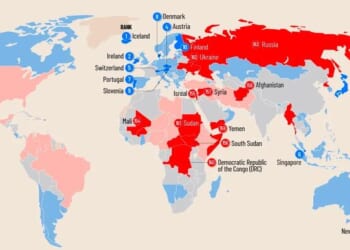The most powerful public statement of my lifetime—a statement so revolutionary it could transform our society and culture in ways we can’t foresee—was uttered by a grieving widow this past Sunday.
“That young man…I forgive him.”
The widow, of course, was Erika Kirk, the wife of slain Christian activist Charlie Kirk, and the “young man” was his alleged assassin, Tyler Robinson. At a memorial service full of amazing speeches (Secretary of State and Catholic Marco Rubio explaining the Incarnation and the Gospel in 90 seconds was just one of many highlights), Mrs. Kirk unleashed a spiritual weapon beyond all human comprehension, beyond the wisdom of this world: forgiveness. She did this on a personal level, as only she could do as a widow, but her public act of forgiveness might very well impact us all.
Before we talk about the public consequences of Mrs. Kirk’s act, however, let us not gloss over the difficulty behind it. I remember living in Steubenville, Ohio in 1999 when three Franciscan University students were slain. At a memorial service, the mother of one of those students forgave the killers. At first I thought it was a nice gesture, but one that any Christian should and would do. But then I considered what I would do if someone killed one of my children or my wife, and I realized forgiveness is not something I’m not sure I could offer. It hit me what an extreme and formidable act forgiveness can be.
If a loved one is killed in cold blood, the natural—the human—reaction is anger and then hatred toward the one who took away your beloved. To forgive in such a situation is literally humanly impossible: you need Christ and his grace to do it. And Erika Kirk accepted that grace and did the impossible: she forgave the one who had committed this incredible evil against her. After she made her act of forgiveness, the crowd immediately recognized what it meant and what it took and rose to their feet in appreciation, with very few dry eyes in the building (or among the millions of people watching online).
As I said, this was a personal act by Erika Kirk, but it unleashed a spiritual power that can make a lasting impact on society by showing clearly for all to see that there are two sides in this battle, and one is good and one is evil. When George Floyd died in 2020, it unleashed Satanic forces that threatened to tear our country apart. There was no talk of forgiveness; just payback in the form of destruction and death. Yet when Charlie Kirk was assassinated, it unleashed perhaps the greatest proclamation of the Gospel in this country—in word and in deeds—we’ve seen since perhaps the 19th century. That’s the difference between the two sides fighting for control of our country’s future. It’s not to say that the side of good doesn’t make mistakes or at times supports things that are contrary to the good, but no objective person can act any more like the two sides are morally equivalent.
We simply cannot overestimate the impact Mrs. Kirk’s beautiful act might have. St. Paul wrote that when we do good for our enemy, we “heap coals on his head” (Romans 12:20). It’s not that we do good in order to crush our enemies, but instead that our good acts shame our enemies and lead outside observers—and even our very enemies—to recognize we are on God’s side and they need to join us. Since our battle today is primarily a spiritual battle (and when isn’t it?), our primary goal in defeating our enemies is their conversion. That’s ultimate victory. That’s what makes our true enemies—the devil and his fallen angels—completely and utterly defeated. Mrs. Kirk put the Gospel in action, and there’s no telling what might now happen.
A final point. Some people were concerned that Mrs. Kirk’s forgiveness of her husband’s killer might mean that the assassin shouldn’t face justice by the State. That somehow Christian mercy conflicts with temporal justice. That’s not how it works. Christianity has always been built on forgiveness as its central doctrine—after all, we are all sinners in need of forgiveness—yet it has always supported the viability of the death penalty (no matter what some quarters these days might say).
These two beliefs are not incompatible or contradictory ideas. The Christian person is commanded to forgive, both for his own personal salvation as well as for the hoped-for salvation of the criminal. The Christian state, however, is required to mete out justice so that the social order can be preserved in order that the proclamation of the Gospel might flourish. So Erika Kirk is right to forgive her husband’s killer, but so is the State right to execute him if it finds him guilty.
It’s quite possible our country is on the verge of a Great Awakening, one that leads many souls to Christ. Pray for our government leaders and their role, but also pray for our Church leaders that they may recognize the moment we are in and use it to bring many souls into Christ’s Church.
This article was originally published on Crisis Magazine.











